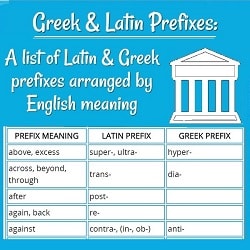Vocabulary from Classical Roots
Most English academic vocabulary is from classical roots. So are a surprising number of very common English words.
According to Dictionary.com, over half the words in an English dictionary come from Greek and Latin. On the Academic Word List, it’s closer to 2/3.
You can study almost 1/3 of those words (from the AWL) on the root pages in EnglishHints.com.
I have tried to emphasize roots that have many useful words, especially words common in academic writing and on tests like the TOEFL, IELTS, and GRE.
On this page there's a short discussion of the reasons so many academic words have classical (Greek and Latin) roots. Then there are examples of words from classical roots and a matching quiz to test your understanding.
(These links let you jump straight to the Greek and Latin root sections or the matching practice.)
Why should this matter to you? Recognizing even a small number of Greek and Latin roots can give you clues to the meaning of unfamiliar words you read.
As a result, you will read more fluently, without stopping to look up as many words. Even more importantly, you can guess at meanings when you can’t use a dictionary-- for example, during a test!
Why Does So Much English Vocabulary Come From Classical Roots?
Most English words with classical roots have come from Latin by way of French. After the Norman Conquest in 1066, French was the official language of England for several hundred years.
Many English words also come from Greek. Some come directly (especially scientific and medical terms). Others come via Latin, which adopted a lot of Greek words.
For example, the Greek word pathos means suffering (or disease). It’s the root of empathy (feeling what another feels) and sympathy (feeling ‘with’ another person.)
That root entered Latin as pati-- to suffer. Its forms passio, pasivus and patheticus are roots of our words passion, passive, compassionate, and pathetic. Note that compassion and sympathy are synonyms, with almost identical meanings. That's not surprising. Com- and sym- are the Latin and Greek prefixes meaning 'with.'
The Greek word kyklos, meaning a wheel or circle, became Latin cyclus and came into English as cycle, bicycle, cyclical, etc.
Well-educated people in the western world before 1900 or so were expected to be able to read Latin. (Many could also read some Greek.) They considered studying the classics in their original languages an important mental discipline.
Latin and Greek provided access to the accumulated wisdom of earlier generations. Latin also allowed scientists and scholars to communicate across national boundaries. It's no wonder so much of our academic vocabulary comes from classical roots!
Words from Greek Roots
Here are some examples of English words that come from classical Greek. (These are all on the Academic Word List-- the AWL. They're in common use among educated English speakers):
‘Analogia was a Greek (then Latin) word that referred to ratios in mathematics. Later it served for comparisons. Two things are analogous if they have similar proportions when compared.
Here's an example of its use in English. The term ‘World Wide Web’ is based on an analogy between the Internet and the connections of a spider web.
'Analysis' also comes into English from Greek. It means separating something complicated into its parts to understand it better.
‘Ideology’ is no longer used for the study of ideas. Now we use it for a system of thinking and belief: Marxist ideology, for example. (We often use it in a negative way to discuss the doctrine of opponents. It can suggest following an official belief instead of thinking for oneself.)
A philosopher is someone who thinks systematically about life, seeking to understand it. The word comes from the Greek philos- love of + sophia- wisdom.
'Theory' comes from Greek & Latin. Its root meant to look at or think about. It has come to mean thinking about rather than using knowledge. (We talk about theoretical as compared to applied science.)
It also means understanding based on thinking and observation. (An example is the theory of gravity.)
See Greek Roots for criteria, hypothesis, logical, psychology, scope, and thesis. (It has explanations and practice for other words that come from Greek as well.)
Vocabulary from Latin Roots
There are too many words with Latin roots on the AWL to try to list them all on one page. The words in Practice with 50 Latin Word Roots are all on the AWL, as well as many others on the pages listed below. This page will just give a few.
Ambiguous comes from the Latin word ambiguus, made from ambi- about or both + agere- to act or drive. It means something vague or uncertain, with several possible interpretations.
Assume, assumption, consume, consumer, consumption, presume, & presumption come from sumere-- to take. To assume is to take something as fact without verifying it.
'Presumption' is similar. It can mean making an assumption beforehand that something is true. It can also mean taking action without the right to do so.
To consume is to use or use up. A consumer is a person who buys and uses products.
‘Classical’ come from classicus (referring to the highest class of citizens.) It's related to our words 'class' and 'classify.' They all come from classis, the Latin word for the division of Roman citizens into groups. Both 'classic' and 'classical' can mean almost anything of enduring quality rather than new or modern.
'Classical' often refers to Greek and Roman civilization from around 600 B.C. to the first few centuries A.D. So 'vocabulary from classical roots' means words that come from Greek and Latin-- the language of the Romans.
Classical music, on the other hand, refers to music that has been appreciated for generations rather than music from ancient Greece or Rome.
To dominate is to control or have a strong influence over others. It comes from dominari-- to rule. The dominant person in a group is the strongest or the one who makes the decisions. A king has dominion (the power to reign) over his dominions. (Those are the territories he controls-- also called his domain.)
’Military’ comes from miles, the Latin word for soldier. It refers to anything connected with a nation’s armed forces. It's in contrast to civilian (from the Latin civilis- an adjective for things connected with citizenship or public life. )
The word ‘norm' means a standard of measurement or judgment. It comes from the Latin word norma- a carpenter’s square. ‘Normal’ originally referred to something made by lining up with that tool. (In other words, it met the usual, acceptable standard.) Now it means usual or regular.
Normal doesn’t always mean good-- just what people usually do. But ‘abnormal,’ does carry a value judgment. Abnormal behavior is not only unusual but troublesome.
‘Enormous’ comes from ex+norma-- out of the ordinary. Now it means huge-- very, very large.
A successor is a person who follows another in an important position. For example, in the U.S. the Constitution sets the order of succession if something happens to the president.
To succeed has two meanings. It can mean to be next to take a position (become king when the old king dies) or to achieve one’s goals. Successive events are events that follow each other. These words all come from sub- (‘under,’ or in this case ‘after’) + cedere (to go).
Vocabulary from Classical Roots: Opposites Matching
Instructions: Match these words from Greek and Latin roots with their antonyms (opposites) in the 2nd column.
There isn't space here to look at much of the extensive English vocabulary from classical roots. See Words from Greek and Latin Roots for explanations of a few more words from Latin and a gap-fill quiz using words from both these pages. There's more practice on the Classical Roots Crossword and its answers.
Other classical vocabulary pages on this site include
- (as well as Vocabulary Practice from 50 Latin Word Roots),
- and English Words from the Latin Root Ponere.
Home> Roots, Prefixes, and Suffixes> Vocabulary from Classical Roots.
Didn't find what you
needed? Explain what you want in the search box below.
(For example, cognates, past tense practice, or 'get along with.') Click to see the related pages on EnglishHints.
| site search by freefind | advanced |
Home>Roots, Prefixes and Suffixes>Vocabulary from Classical Roots.










